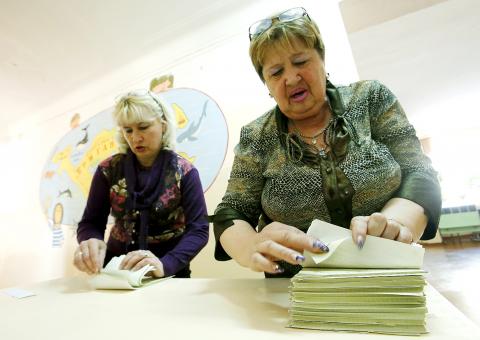Ukraine braced yesterday for a breakaway vote in Crimea as deadly violence flared again in the ex-Soviet country’s tinderbox east amid the biggest East-West showdown since the Cold War.
The second successive day of deadly unrest that has claimed at least three lives in the mainly Russian-speaking east came hours after Moscow — its forces already in control of Crimea and conducting snap drills at Ukraine’s eastern border — warned that it reserved the right to “protect” compatriots throughout its neighbor.
US Secretary of State John Kerry had on Friday failed to either avert today’s ballot in Crimea or win Russian Minister of Foreign Affairs Sergei Lavrov’s assurance that Moscow may delay annexing the Black Sea region that Ukraine received as a “gift” from then-Soviet leader Nikita Khrushchev in 1954.

Photo: Reuters
The rugged peninsula of 2 million mostly Russian speakers is widely expected to vote to split from Ukraine and join Russia after its lawmakers declared independence from Kiev earlier this month.
The referendum comes in direct response to three months of deadly protests which on Feb. 22 toppled the pro-Kremlin former president and brought to power a new nationalist European-leaning team in Kiev, infuriating Moscow, which views Ukraine as its strategic sphere of influence and wants to retain influence over its former Soviet satellite.
Kiev has denounced the Crimean vote as illegal, but is also warily watching as similar separatist sentiments are being fanned by Moscow supporters in other industrial regions in mostly Russian-speaking eastern Ukraine, which has deep cultural and trade ties to Russia.
Yet Moscow — whose troops took effective control of Crimea in the days after the Ukrainian president’s Feb. 22 fall — strongly backs the referendum, despite a new round of painful sanctions against top Russian officials that Washington and EU nations are expected to unveil tomorrow.
Ukrainian Prime Minister Arseniy Yatsenyuk said he expected to sign in Brussels on Friday the political portion of an historic EU Association Agreement, whose rejection in November last year by the deposed government sparked the initial Kiev unrest.

MAKING WAVES: China’s maritime militia could become a nontraditional threat in war, clogging up shipping lanes to prevent US or Japanese intervention, a report said About 1,900 Chinese ships flying flags of convenience and fishing vessels that participated in China’s military exercises around Taiwan last month and in January last year have been listed for monitoring, Coast Guard Administration (CGA) Deputy Director-General Hsieh Ching-chin (謝慶欽) said yesterday. Following amendments to the Commercial Port Act (商港法) and the Law of Ships (船舶法) last month, the CGA can designate possible berthing areas or deny ports of call for vessels suspected of loitering around areas where undersea cables can be accessed, Oceans Affairs Council Minister Kuan Bi-ling (管碧玲) said. The list of suspected ships, originally 300, had risen to about

DAREDEVIL: Honnold said it had always been a dream of his to climb Taipei 101, while a Netflix producer said the skyscraper was ‘a real icon of this country’ US climber Alex Honnold yesterday took on Taiwan’s tallest building, becoming the first person to scale Taipei 101 without a rope, harness or safety net. Hundreds of spectators gathered at the base of the 101-story skyscraper to watch Honnold, 40, embark on his daredevil feat, which was also broadcast live on Netflix. Dressed in a red T-shirt and yellow custom-made climbing shoes, Honnold swiftly moved up the southeast face of the glass and steel building. At one point, he stepped onto a platform midway up to wave down at fans and onlookers who were taking photos. People watching from inside

Japan’s strategic alliance with the US would collapse if Tokyo were to turn away from a conflict in Taiwan, Japanese Prime Minister Sanae Takaichi said yesterday, but distanced herself from previous comments that suggested a possible military response in such an event. Takaichi expressed her latest views on a nationally broadcast TV program late on Monday, where an opposition party leader criticized her for igniting tensions with China with the earlier remarks. Ties between Japan and China have sunk to the worst level in years after Takaichi said in November that a hypothetical Chinese attack on Taiwan could bring about a Japanese

STREAMLINED: The dedicated funding would allow the US to transfer equipment to Taiwan when needed and order upgraded replacements for stockpiles, a source said The US House of Representatives on Thursday passed a defense appropriations bill totaling US$838.7 billion, of which US$1 billion is to be allocated to reinforcing security cooperation with Taiwan and US$150 million to replace defense articles provided to the nation. These are part of the Consolidated Appropriation Act, which the US House yesterday passed with 341 votes in favor and 88 against. The act must be passed by the US Senate before Friday next week to avoid another government shutdown. The US House Committee on Appropriations on Monday unveiled the act, saying that it allocates US$1 billion for the Taiwan Security Cooperation Initiative